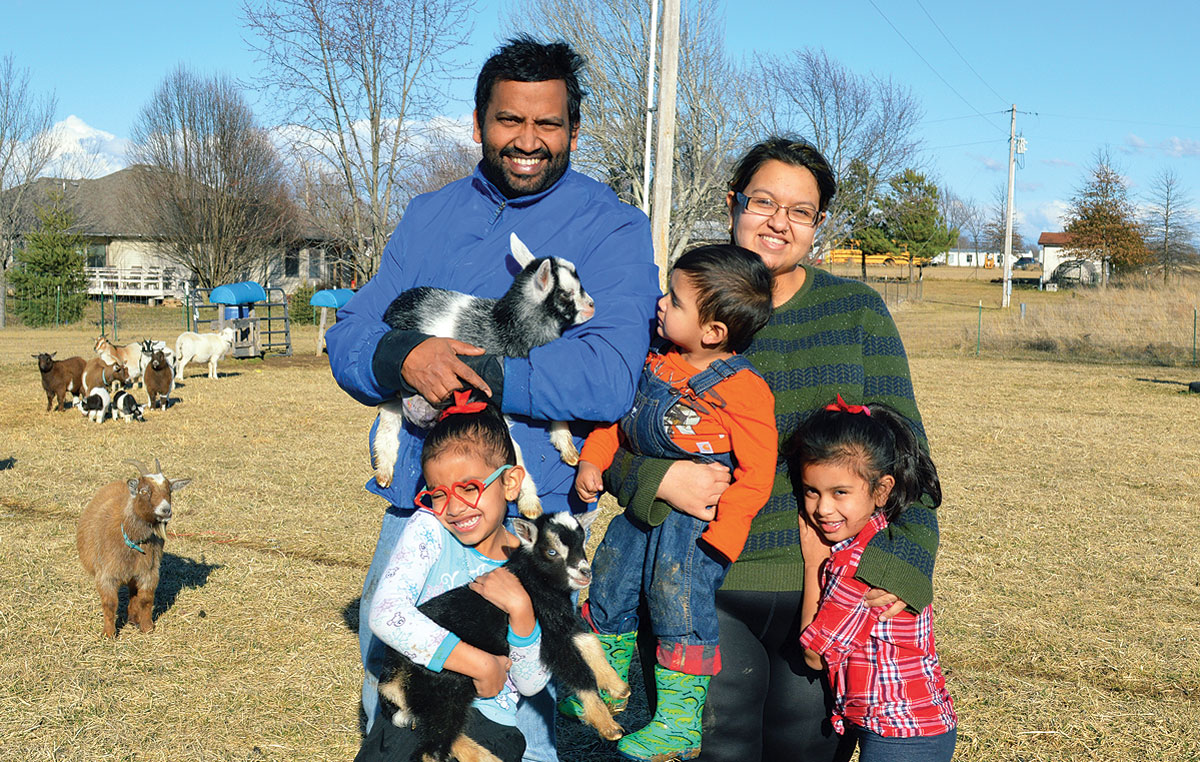
Ven and Amanda Dhandapani draw on their diverse agriculture roots to start their own family farm
When you are the daughter of a cowboy raised on the King Ranch, the birthplace of American ranching, farming flows through your veins. Though Amanda Dhandapani’s farm in Buffalo, Mo., is a far cry from the 825,000-acre King Ranch in Texas where she grew up, it is all her own.
“I want the ranch life for my kids. I grew up with that life and I want that life for my children as well. It teaches them responsibility,” Amanda Dhandapani explained.
Amanda and her husband, Ven, moved the Ozarks four years ago for Ven’s job in information technology. The couple started their farm with one buckling Nigerian Pygmy goat, named Billy Ray. In a few short years the Dhandapanis maximized their small acreage to facilitate a vibrant operation called Chick N Goats Family Farm, LLC.
Amanda gleaned her farm knowledge from her father, who started working as a cowboy for the King Ranch at a young age.
“I remember every Sunday when we were small, my dad would take us to work,” Amanda recalled. “We would be able to roundup the cattle that needed to get shots and we would go horseback riding through the pastures to make sure gates were closed.”
Ven Dhandapani’s farming experience comes from his childhood on his parents’ rice farm in India.
“Agriculture is very different in India compared to the United States,” Ven said.
Armed with determination and their own personal experiences, the couple foraged ahead with a vision for making the most of their 4 acres.
In the beginning, the Dhandapanis purchased meat goats and chickens with the sole intent of raising some of their own food.
“At first it was for our own personal use, but then it grew into much more than that,” Ven explained.
The first part of the business to boom was their goat herd. In addition to raising Nigerian Pygmy goats, the Dhandapanis added 75 percent Nubian and 25 percent Lamancha does to their herd. The couple selected the Nubian cross goats and Nigerian Pygmy goats due to their dual-purpose nature.
Now Chick N Goats Family Farm LLC., owns two bucks, 11 does and nine kids. The Dhandapanis wean their kids at 3 months old or sell them as bottle babies.
“I give our buyers the option. We can keep them until they are weaned. If they want bottle babies, then they will come directly off the mom,” Amanda said.
The Dhandapanis are looking forward to their latest venture in their goat business. They bred their Nubian-Lamancha cross does to their Nigerian Pygmy buck – this mating will produce Kinder goats. According to the Kinder Goat Breeders Association, Kinder goats average 100 to 125 pounds, produce a large amount of milk for their size, reach 70 percent of their full weight before they are a year old, and have a dress out percentage of 60 percent.
“They make a great meat goat,” Amanda added.
Though the Dhandapanis jumped right into the goat business, it took a year of planning and preparation before they started the poultry side of their operation. It began with Amanda researching and designing the coop.
Ven built the coop on weekends and evenings whenever he had spare time and the weather cooperated.
“We got our baby chicks from Cackle Hatchery located in Lebanon, Mo. While we were raising them in our brooder, we finished building our run space and coop,” Amanda said.
Once the chicks hatched, the poultry business was up and running. The Dhandapanis original plan included a handful of breeds but that didn’t last long.
“At first, I just wanted to stick with a few breeds, but then I ended up seeing ones that I liked, like the lavender Orpingtons,” Amanda said with a big smile.
Their flock of 60 includes Plymouth Bard Rocks, Bielefelders, orange and lavender Buff Orpingtons, Wyandottes, Easter Eggers, Ameraucanas, Black Jersey Giants and White Jersey Giants, plus black and white Silkies. The Dhandapanis purchase some of their poultry as chicks but find it more economical to hatch their own in incubators. In the height of season, Chick N Goats Family Farm LLC., sells at least 20 dozen eggs a week.
The Dhandapanis focus on two quail breeds, Texas A&M and Jumbo Coturnix, which are larger quail breeds. The Jumbo Coturnix are fast growing and can weigh up to 14 ounces. The Texas A&M weigh between 12 and 14 ounces at maturity. Their quail flock has been popular with their customers. “We have been selling live birds because people want them to breed,” Amanda explained.
The Dhandapanis relish farm life with their children – 6-year-old Jodhaa, 4-year-old Katreena, and 1-year-old ReVaughn. And just like their farm, the Dhandapani family is growing – they are expecting twin boys in August.






